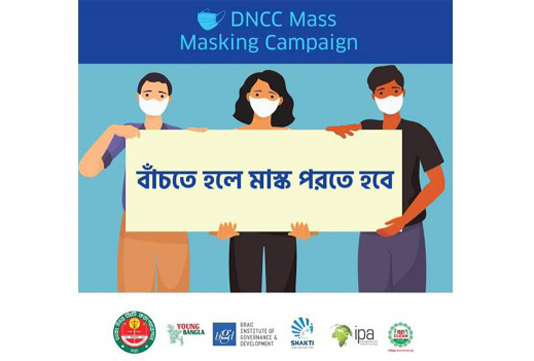DHAKA, May 12, 2021 (BSS) – Dhaka North City Corporation (DNCC) has launched a mass-masking campaign to substantially ensure proper mask-wearing in Dhaka and consequently reduce Covid-19 transmission and save thousands of lives.
The campaign, led by the city corporation Mayor Md Atiqul Islam, was brought forth in partnership with local and global organizations named Innovations for Poverty Action (IPA), Yale University, Stanford Medical School, Centre for Research and Information (CRI), Shakti Foundation for Disadvantaged Women, BRAC Institute of Governance and Development (BIGD), and BD Clean.
Volunteers from Young Bangla, the youth secretariat of Centre for Research and Information (CRI), a not for profit research organisation, teamed up with the organizations to leverage the impact created by the life-saving initiative, a CRI press release said.
In the first design meeting of the campaign, the Mayor said, “We need to learn how to manage our lives to cope with the threat of Covid. Proper mask wearing is a critical part of that.
“This challenge needs broad partnership. I am very happy that we are forming a global partnership — the DNCC Mass Masking Campaign—to tackle this big challenge,” he said.
The Mass Masking Campaign is based on a model called NORM (NORMalize mask-wearing model). Developed by Yale University, Stanford University, and IPA, in partnership with GreenVoice, a local NGO, NORM was rigorously researched using a large-scale randomized evaluation.
The research was similar to vaccine trials, involving 350,000 people across 600 unions throughout Bangladesh for the last four months. NORM for rural Bangladesh includes four components: distributing free masks, offering information on mask-wearing, reinforcing mask-wearing in-person and in public, and modeling and endorsement by trusted leaders.
NORM increased mask wearing by three times and the results sustained 10 weeks into the model implementation, even after the mask promotion ended. The new DNCC campaign has adapted this model to fit the Dhaka context.
“Ensuring consistent mask-wearing has been a stubborn challenge” said Mushfiq Mobarak, Professor of Economics at Yale University, a lead researcher of the NORM study.
“Bangladesh innovated to create a model that can change masking norms quickly, and this is now being replicated globally across a few states in India and Pakistan, and in Latin America. The DNCC mayor’s decisive leadership is allowing us to implement quickly in Dhaka, before the critical Eid travel period,” he said.
CRI’s policy magazine WhiteBoard’s December 2020 issue on “Covid-19: Recover and Reimagine” highlighted the early findings of IPA’s collaborative research on the dynamics and benefits of mask-wearing in various settings in Bangladesh.
“What is sure beyond reasonable doubt is that large-scale mask-use and vaccination is the best way to fight the pandemic. As part of this campaign, CRI’s Young Bangla platform continues its on-ground awareness programs and policymaking support on safe-volunteerism and mask-usage,” said Syed Mafiz Kamal, Senior Analyst at CRI.
With the upcoming Eid rush in shops, markets, and transportations during this week, the Mass Masking Campaign will use the principles of NORM and run a mask wearing campaign involving 150 volunteers across eight crowded locations of DNCC area.
Imran Ahmed, Deputy Executive Director of Shakti Foundation said, “Covid-19 is here to stay at least for the foreseeable future. It is crucial that we strategize our policies and efforts to continue with economic activities while minimizing the risk of spread of the virus.”
Shakti Foundation, with an outreach of half a million low-income families, has undertaken a number of programs including awareness campaigns, mask distribution, health services hotline and medical services with special assistance for Covid-19 affected people.
“We in Shakti are honored to be the implementing partner of this campaign with our expertise in community outreach,” Ahmed said.
The campaign has a strong learning component through quantitative and qualitative monitoring.
Data will be collected daily through field action research to provide real-time feedback to improve the campaign’s effectiveness and contextualize the model.
Adapting the model in the crowded, mobile and complex community context of the urban area will require us to learn fast.
BIGD as an action research institute is really excited to be part of this learning partnership, said Imran Matin, the Executive Director of BIGD.



